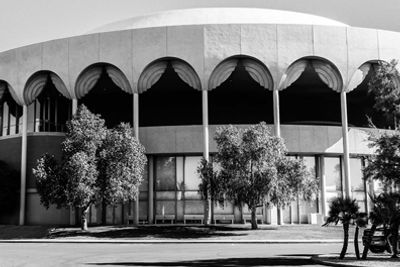By Richard Schultz, Aug. 28, 2014.
As Arizona State University’s Grady Gammage Memorial Auditorium celebrates its 50th anniversary as a top cultural destination, executive director Colleen Jennings-Roggensack believes that it will continue to play a vital role in the Valley as a beacon of enlightenment, reflecting changes in society through its programming.
“I believe President Gammage and Frank Lloyd Wright’s dream about a magnificent theater to house the world’s best art and culture for the community has come to fruition,” Jennings-Roggensack said.
Considered the last public commission by Wright, the theater’s groundbreaking took place May 23, 1962, and construction took 25 months to complete. The building opened in 1964 with a performance by the Philadelphia Orchestra, conducted by Eugene Ormandy.
“What 50 years have taught us is that the original vision for the building as a place to gather and think, contemplate, laugh and be challenged is alive and well,” Jennings-Roggensack said. “We’ve seen changes in the cultural landscape of the country and the world. What was exotic then is commonplace now. Artists that we brought in from Asia, Mexico and Africa in the past are now individuals who reside in the U.S.”
The common factor, she said, is that people want to hear other people’s stories.
“Art isn’t a one-time occurrence, but the knowledge of culture is about the depth of experience,” Jennings-Roggensack said. “We continue to have artists in residence, like great artist and gay advocate Bill T. Jones, whose work is onstage and offstage as they engage with audiences in their seats and in the community.”
As Arizona’s only voting member for the Annual Tony Awards, Jennings-Roggensack can justifiably name drop with the best of them. She casually mentions that she recently attended the Tony nomination luncheon and sat with gay playwright Harvey Fierstein.
She easily recounts the battle to get Tony Kushner’s epic Angels in America to Tempe in 1993.
“I spent 18 months meeting with the leaders and producers to bring this production to Arizona,” she said. “The company came, but was afraid to walk downtown and were concerned about the audience’s reaction. This was the first time Angels in America was performed outside of the east or west coasts. Yet, all the performances sold out and ASU President Lattie Coor only got three letters, and two of those were in support of the production.”
She adds that the Tempe performances created the inspiration for touring the play nationally.
Jennings-Roggensack believes that Gammage has played a role in Arizona’s growing up. And there have been several significant accomplishments that support this notion.
Bourne’s controversial Swan Lake. Photo by Bill Cooper.
In the 1995-1996 season, Gammage presented the NEA four banned artists, Tim Miler, Holly Hughes, John Fleck and Karen Finley. Gammage also hosted the national road presentation of Matthew Bourne’s Swan Lake in 2006, which is best known for having the traditionally female parts of the swans danced by men.
Most recently, she has often been asked when The Book of Mormon, winner of nine Tony Awards, including Best Musical, will come to Tempe.
“I’m thrilled and excited that The Book of Mormon will be part of our 2015-2016 season,” she said. “I’ve talked to Mormon leaders and funders. The show will first play in Salt Lake City and then Gammage. In all conversations, it is most clear to me that this musical is about having faith.”
ASU Gammage is one of the largest university-based presenters of performing arts in the world and a top touring market for Broadway. Home to the Broadway Across America — Arizona and BEYOND series, the mission of Connecting Communities goes beyond the stage and the programs and impacts the community through shared experiences in the arts.
Jennings-Roggensack added that she takes great pride in Gammage’s relationship with the LGBT community and cites the organization’s work with transgender youth and the importance of reaching out and encouraging dialogue around issues within the LGBT community.
In looking toward the future, she insists that Gammage will “continue to explore great quality work that pushes boundaries.” As a self-professed military brat, she has watched the military change over the years and anticipates that works exploring returning veterans and their issues will come to the forefront in the coming years.
When she looks to Gammage’s next 50 years, she sees great potential and expects to host more events — like the Clinton Global Initiative and presidential debates — that affirm Gammage’s prominence on the local and national levels.
